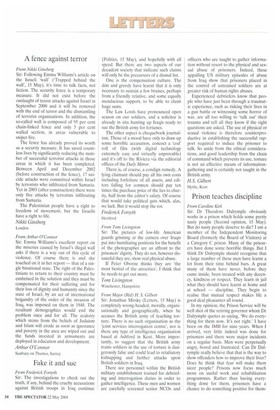Fake it and sue
From Frederick Forsyth Sir: The investigations to check out the truth, if any, behind the cruelty accusations against British troops in Iraq continue (Politics, 15 May), and hopefully with all speed. But there are two aspects of our decadent society that indicate such claims will only be the precursors of a dismal list.
One is the compensation culture. The dim and greedy have learnt that it is only necessary to sustain a few bruises, perhaps from a friendly relative, and some equally mendacious support, to be able to claim huge sums.
The Law Lords have pronounced open season on our soldiers, and a solicitor is already in situ hunting up Iraqis ready to sue the British army for fortunes.
The other aspect is chequebook journalism. Those of a mood have only to draw up some horrible accusation, concoct a 'cod' roll of film (with digital technology extremely easy and virtually unprovable) and it's off to the Riviera via the editorial offices of the Daily Mirror.
There is, of course, a condign remedy. A lying claimant should pay all his own costs including forfeiture of all assets, and editors falling for conmen should pay ten times the purchase price of the lies to charity, half from the editor's salary. Of course that would take political guts which, alas, we lack. But it would stop the rot.
Frederick Forsyth
Hertford
From Tom Livingston Sir: The pictures of low-life American guards grinning at the camera over Iraqis put into humiliating positions for the benefit of the photographer are an affront to the prisoners' dignity. They do not, however distasteful they are, show real physical abuse.
If Peter Oborne thinks they are 'the most bestial of the atrocities', I think that he needs to get out more.
Tom Livingston
Winchester, Hampshire
From Major (Rid) H. S. Gilbert Sir: Jonathan Mirsky (Letters, 15 May) is completely wrong-headed, morally, organisationally and geographically, when he accuses the British army of teaching torture. There is no such organisation as the 'joint services interrogation centre', nor is there any type of intelligence organisation based at Ashford in Kent. More importantly, to suggest that the British army trains soldiers in the use of torture is dangerously false and could lead to retaliatory kidnapping and further attacks upon British soldiers in Iraq.
There are personnel within the British military establishment trained for debriefing and interrogation duties in order to gather intelligence. These men and women are carefully screened senior NCOs and officers who are taught to gather information without resort to the physical and sexual abuse of prisoners. Indeed, these appalling US military episodes of abuse from Iraq show that prisoners placed in the control of untrained soldiers are at greater risk of human rights abuses.
Experienced debriefers know that people who have just been through a traumatic experience, such as risking their lives in a gun battle or witnessing some horror of war, are all too willing to 'talk out' their trauma and tell all they know if the right questions are asked. The use of physical or sexual violence is therefore counterproductive in establishing the successful rapport required to induce the prisoner to talk. So aside from the ethical considerations, and good leadership from the chain of command which prevents its use, torture is not an effective means of informationgathering and is certainly not taught in the British army.
H.S. Gilbert
Hythe, Kent


















































































 Previous page
Previous page